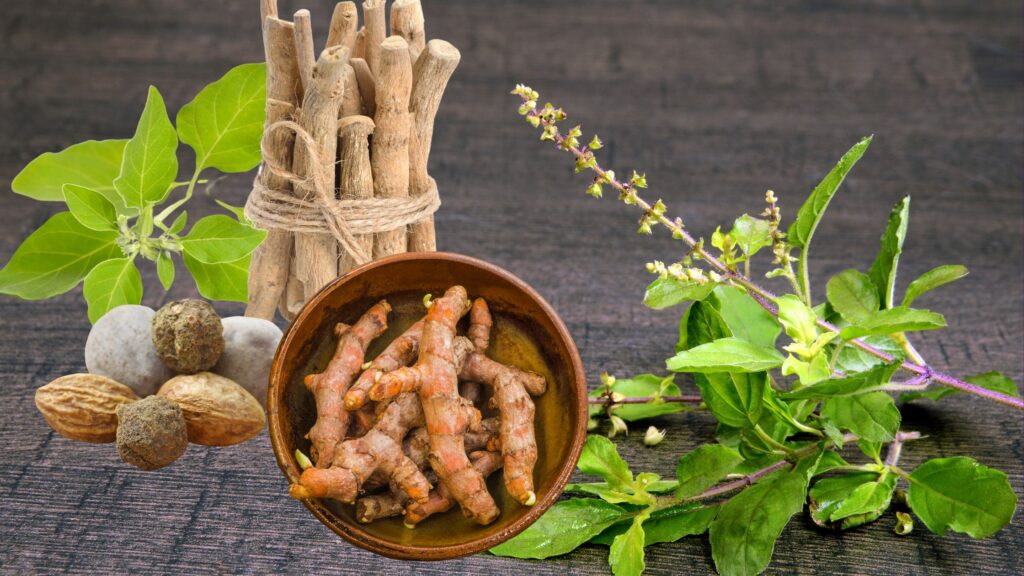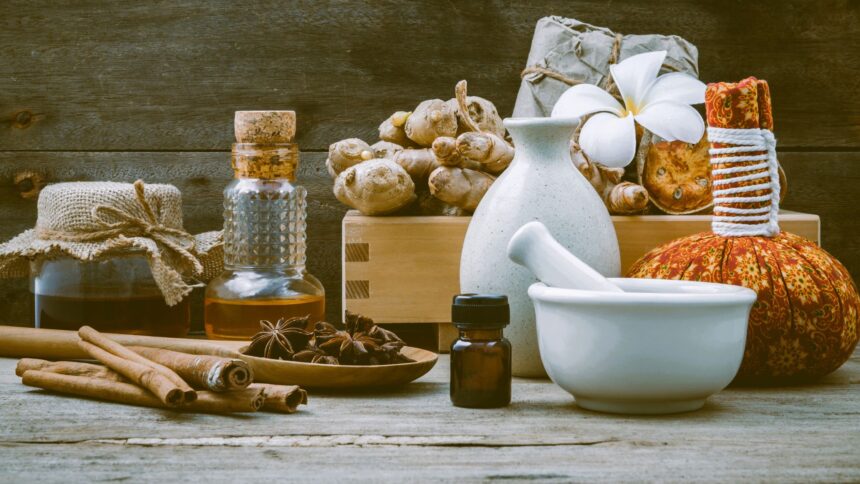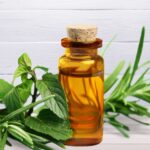For centuries, Ayurvedic medicine has relied on the healing properties of herbs and plants to promote balance and wellness within the body. But in modern times, we’ve lost touch with these traditional wisdoms and turned instead to artificial quick fixes. Some years ago, dissatisfied with conventional options that treated symptoms but not root causes, a journey into Ayurveda’s herbal approach completely altered my path. Where prescription medications left me feeling depleted, healing botanicals eased issues and empowered sustainable change from within. Through regularly incorporating Ayurvedic herbs tailored to my unique constitution, I found my well-being and quality of life profoundly upgraded.
Exploring Ayurvedic Herbs

All beings aim to maintain stable equilibrium and optimal functioning. In Ayurveda, proper diet, lifestyle, routine, and herbal supplements specific to one’s individual dosha composition support this natural order. After diagnostic testing, an Ayurvedic practitioner can design an herbal protocol customized for mind-body type, current health conditions, and long-term wellness goals. Some commonly prescribed herbs include:
Tulsi (Holy Basil): Known for its power to balance vata and pitta doshas, tulsi soothes anxiety and stress while warming the deeper tissues. Its benefits are wide-ranging from respiratory health to gastrointestinal comfort.
Ashwagandha: This renowned Indian ginseng balances vata and kapha types while energizing the mind and body. Studies show it reduces inflammation, boosts resilience to daily stressors, and supports restorative sleep.
Triphala: A revered formula combining three diverse fruits, triphala’s regular use gently cleanses and rejuvenates all tissues. Its antioxidant-rich profile helps maintain youthfulness while easing occasional digestive upset.
Turmeric: Related to ginger, the golden-hued turmeric balances all doshas and reduces inflammation throughout the physiology. Its curcumin content especially protects liver function and aids detoxification pathways.
Properly prepared under an Ayurvedic practitioner’s guidance, herbs yield far more therapeutic effects than isolated extracts. By addressing imbalances at their root, herbs empower self-healing from within naturally over time.
Some treatments by different Ayurveda herbs
- Ayurveda herbs for anxiety – Certain Ayurvedic herbs like Brahmi, Jatamansi, Ashwagandha, and Gotu Kola have exhibited anti-anxiety benefits in studies by modulating brain neurotransmitters like GABA and reducing stress hormones. Taking these herbs as supplements or in tea can support a calmer mindset.
- Herbs in Ayurvedic medicine – Ayurveda relies heavily on phytotherapy using hundreds of medicinal plants and their active constituents for healing. Common herb categories include rasayanas for rejuvenation, aromatics for digestion, nervine tonics, and more based on the Ayurvedic principle of treating the whole person.
- Common Ayurvedic medicinal plants – Some frequently employed plants in Ayurveda are Turmeric, Tulsi, Neem, Amla, Ashwagandha, Mucuna, Shatavari, Bacopa, Gotu Kola, and others. These plants and herbs offer antioxidant, anti-inflammatory, antimicrobial, and adaptogenic advantages for well-being.
- Ayurvedic herbal supplements – Formulations like Chyawanprash, Triphala, Brahmi, and Ashwagandha supplements can enhance strength, immunity, and brain health, and reduce oxidative stress when taken regularly. Standardization ensures consistent active ingredients for balanced dosing.
- Benefits of Ayurvedic herbal remedies – Traditional herbal remedies as described in Ayurvedic texts can naturally support all body systems when used appropriately. Regular usage aids purification, nourishment, tissue regeneration, and restoring balance at physical, and mental-emotional levels for complete health renewal according to individual constitution.
- Ayurvedic herbs for digestion – Warming carminatives like ginger, peppermint, and fennel seed; bitter tonics like turmeric, fenugreek, and coriander; and digestive herbs like Triphala, Amalaki support agni or digestive fire to optimize metabolism and nutrient assimilation from foods for balanced energy levels.
- Adaptogenic Ayurvedic herbs – Ashwagandha, Tulsi, Holy Basil, and Rhodiola are revered Ayurvedic adaptogens that help balance stress responses, reduce fatigue, optimize immune function, and promote resilience through antioxidant protection at the cellular level.
- Anti-inflammatory Ayurvedic herbs – Powerful turmeric, ginger, boswellia, and garlic inherently counter inflammatory processes and associated conditions when included regularly in one’s Ayurvedic protocol or supplemental routine.
- Ayurvedic herbs for thyroid health – Fenugreek seeds, ashwagandha, and Indian gooseberry support healthy thyroid and hormone balance, while turmeric and ginger help reduce autoimmune inflammation tied to thyroid disorders for restored wellness.
- Memory-boosting Ayurvedic herbs – Bacopa monnieri, Brahmi, Gotu kola, and Rosemary contain compounds like bacosides that help upregulate specific neurotransmitters favoring sharper cognitive abilities, focus, and recall power over time with intake of these nervine brain nourishing herbs.
- Immune-boosting Ayurvedic herbs – commonly used in Ayurvedic preparations to strengthen immunity include ginger, turmeric, tulsi, mulethi, garlic, and amla either in supplemental or dietary form deliver antioxidants and micronutrients necessary for robust immunity defense against threats.
- Nervine Ayurvedic herbs -Herbs in Ayurveda that nourish and protect the nervous system and positively impact mental health are Ashwagandha, Brahmi, Jatamansi, Shankhpushpi, Bacopa monnieri, Tulsi and others regularly included in formulas to promote relaxation, focus and neurological regeneration.
- Antimicrobial Ayurvedic herbs – Ayurveda relies on the natural anti-infective prowess of goldenseal, oregano, neem, garlic, turmeric, and others which mitigate infection through compounds damaging to microbial cell structures, limiting replication and toxicity to protect overall health.
- Detoxifying Ayurvedic herbs -Traditional internal cleansing herbs like triphala, ginger, gotu kola, licorice, and turmeric support the liver in metabolizing and eliminating toxins from the system to correct imbalances, optimize functioning and prevent disease through balanced detox pathways.
- Rejuvenating Ayurvedic herbs -Ayurvedic rejuvenative rasayana herbs like ashwagandha, amla, ginger, turmeric possess nourishing properties as well as the potency to ward off age-related degeneration renewing healthspan and lifespan longevity as per Sushruta Samhita, one of the classical Ayurveda texts.
- Pain-relieving Ayurvedic herbs – Components like gingerols in ginger, curcuminoids in turmeric along with boswellia, ashwagandha, arnica in formulations exert analgesic action modulating pain impulse transmission and soothing inflammation centrally and peripherally for musculoskeletal discomfort relief.
- Rasayana herbs in Ayurveda – According to Ayurvedic literature, main rasayana groups include amla, ashwagandha, ginger, mugwort, turmeric which renew cellular functions, enhance immunity, brain power, and reproductive/cardiovascular health to retard aging and fully expressing one’s genetic potential.
- Herbal formulas in Ayurveda – Standardized Ayurvedic herbal combinations (e.g. Triphala, Brahma Rasayana) provide therapeutic results that isolated extraction-based modern supplements lack due to synergistic phytocomplex action profile based on the dosha(s) targeted.
- Ayurvedic pharmacy – Ayurvedic colleges and institutions teach the proper identification, collection, processing, compounding and storage of herbs per authentic texts to formulate preservation of healing qualities for revitalizing people as nature designed through botanical knowledge.
- Traditional Ayurvedic herbalism – Ayurveda is the traditional system of medicine in India using native herbs scientifically established to have restorative properties addressing root of imbalances holistically rather than suppressing symptoms alone for real transformation to dynamic homeostasis and disease prevention over many generations.
My Ayurvedic Herbal Journey
After evaluation, my practitioner determined I had moderate vata and pitta aggravation due to intense lifestyle factors. Chronic stress and an acidic diet eroded my digestion and left me prone to illness. She recommended simple adjustments like daily meditation alongside specific Ayurvedic herbal tonics tailored to my needs. Within weeks of consistently following my protocol, subtle yet profound changes arose.
For example, ashwagandha and brahmi calmed my frazzled nerves while Shatavari soothed occasional indigestion. Triphala regulated elimination and uplifted my energy. Turmeric’s anti-inflammatory aid noticeably relieves joint pain caused by years of strenuous activity. For ongoing balanced wellness, I learned to rotate these herbs seasonally as my constitution dynamically adapted.
Gradually, old habits dissolved as my inner ecosystem regained balance. Where prescription drugs brought only temporary fixes, Ayurvedic herbs empowered me to thrive sustainably from within using nature’s pharmacy. This holistic approach aligned mind, body, and spirit for unprecedented performance and quality of life. I realized true wellness emerges organically when honoring our innate wisdom for self-healing and interconnectedness.
Conclusion
For millennia, Ayurvedic knowledge has upheld nature’s time-tested remedies as the optimal means for maintenance and recovery. Lost to many today, traditional herbalism still holds the keys to attaining vibrant longevity by addressing root imbalances instead of symptoms alone. Through an Ayurvedic herbal protocol tailored to my unique prakruti and current needs, equilibrium once more became attainable effortlessly from the inside out. By regularly incorporating healing botanicals in harmony with my doshas, I rediscovered my innate capacity to self-heal and perform at full potential. This life-changing journey clearly shows nature’s pharmacy still outpaces modern alternatives for establishing sustainable wellness from within permanently.




